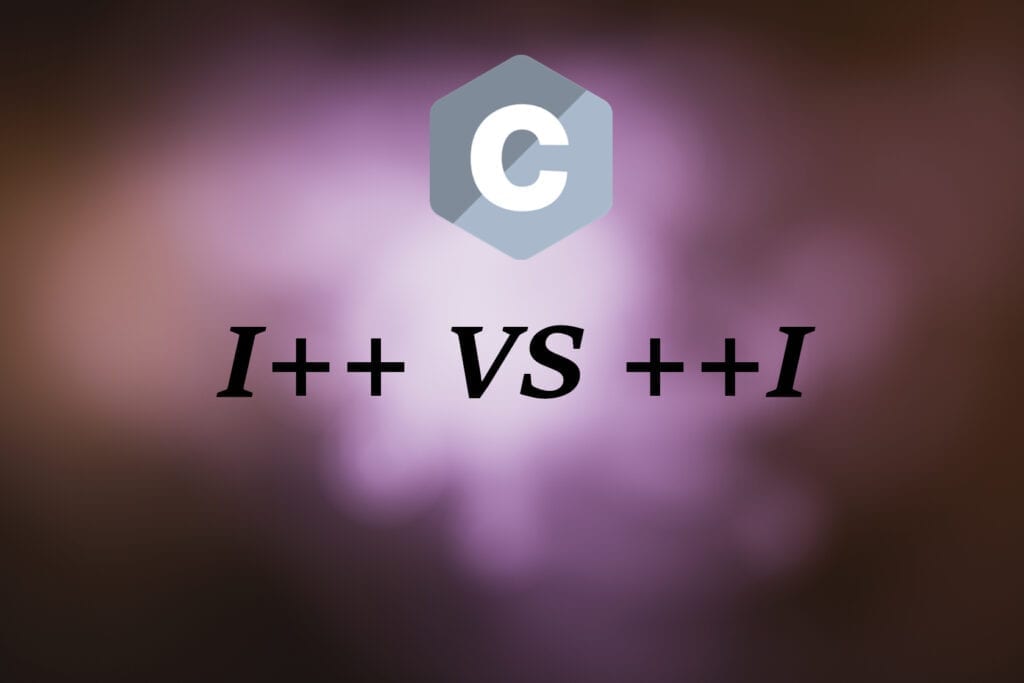i++ or ++i? Which is the more efficient? Let me tell you a short story.
A few years ago, a colleague caught me using i++ in a "for loop" during a code review. He lectured me about why the usage of i++ is not correct for a performance matter. Unfortunately, his explanation was incomplete.
Since this day, I am using ++i. For performance matter? No, principally to avoid a long explanation about why I was using i++.
Today, I realized that I never checked why some developers prefer one or the other version. Let's check together!
When to use the "i++" or "++i"?
Some people could say that the difference is not important. However, the usage of i++ and ++i is so common that the knowledge of their difference is primordial. The devil is in the details. This kind of code reveals perfectly the difference:
#include <stdio.h> int main() { int i = 0; int j = 0; printf("FIRST: i = 0, with ++i ==> %d\n", ++i); printf("SECOND: j = 0, with j++ ==> %d\n", j++); printf("THIRD: i = %d, j = %d\n", i, j); return 0; }
Now, let's build and execute this code:
FIRST: i = 0, with ++i ==> 1 SECOND: j = 0, with j++ ==> 0 THIRD: i = 1, j = 1
- ++i : Increment the value and returns the incremented value.
→ Increment before the function call/operation. - i++ : Increment the value but returns the original value (before being incremented)
→ Increment after the function call/operation.
What about the performances?
After some tentative, conversion to assembly code, etc. Short Answer: The difference is minimal. In the majority, the compiler optimizes your code.
Performances concerning the speed
++i is always faster than i++. This kind of code shows the difference:
#include <stdio.h> int main() { int i = 0; int j = ++i; return 0; }
#include <stdio.h> int main() { int i = 0; int j = i++; return 0; }
And now, let's see the assembly code (GCC 8.3) - On the right, ++i. On the left, i++ (Usage of Compiler Explorer):
++i case:
i++ case:
There is only one instruction difference between ++i and i++.
Indeed, in the ++i case, we see that the variable "i" is first incremented before the assignment to a new variable - Pretty simple!
Concerning the i++ case, the operation is a bit more complex:
- First, "mov" to save the data variable in another registry. - eax = 0
- Second, the instruction "lea" load a new "edx" value incremented by one. - edx = 1
- Third, "mov", "edx" is copied in the variable "i". - i = edx →i = 1
- Last, "mov", the saved value "eax" (equal to 0) is copied in "j". j = eax → j = 0
When ++i and i++ have the same speed?
During a simple operation (without other variable implied or functions), I get the same performances:
#include <stdio.h> int main() { int i = 0; for(; i < 10; ++i) { printf("i = %d\n", i); } return 0; }
#include <stdio.h> int main() { int i = 0; for(; i < 10; i++) { printf("i = %d\n", i); } return 0; }
Here you know the routine! Let's check the assembly code!
++i case:
i++ case:
The output is the same... There are no differences in the performances.
What about the compiler used?
The usage of ++i is recommended.
As we saw, the difference is minimal and is applicable during function calls or "complex" operations. i.e, when the variable value should be saved with i++.
Another point concerning this post: The performances between ++i and i++ is highly dependent on your compiler.
Re-test those codes with a MSVC compiler; you'll see a result entirely different!
++i case:
i++ case:
Summarize - So, i++ or ++i?
Now, you know everything about ++i and i++. I want to highlight those points:
- ++i is always faster than i++.
- If there are no reasons to use i++, The recommendation is to use ++i.
- In for loops, no performance differences.
- No function call, simple operation. The compiler will optimize.
- Highly dependent on the compiler
- The performance difference is not apparent and not always true
- The performance depends on the function used, operation and compiler.

